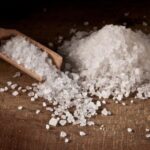It’s a common kitchen mishap: you’re looking forward to a perfectly cooked potato, only to find it has exploded in your microwave or oven. This can be frustrating and messy, leaving you wondering, “Why Did my potato explode?” This article delves into the reasons behind potato explosions and provides practical tips to prevent them, ensuring your potatoes cook perfectly every time.
Potatoes, especially russet potatoes, are naturally high in moisture content, typically around 80% water. When heated, this water turns into steam. If the steam cannot escape, pressure builds up inside the potato, leading to an explosion. Think of it like a pressure cooker – without a vent, the pressure would become too great.
The microwave cooking process can exacerbate this issue. Microwaves heat food by exciting water molecules. Because microwaves penetrate food from the outside in, the outer layers of the potato can cook and become firm faster than the interior. This creates a sealed environment where steam from the inner parts of the potato is trapped. As the internal steam pressure increases, it eventually overcomes the potato’s skin strength, causing it to burst open.
Even in a conventional oven, similar principles apply. While oven heat is more gradual than microwave energy, a potato’s skin can still become relatively impermeable to steam as it cooks. If there’s no escape route for the internal steam, an explosion can occur, though it might be less dramatic than a microwave explosion.
Several factors can contribute to why your potato exploded:
- Moisture Content: Potatoes with higher water content are more prone to exploding as they produce more steam when heated.
- Potato Size and Shape: Larger potatoes contain more water and take longer to heat through, increasing the chance of pressure build-up. Similarly, potatoes with fewer surface area relative to their volume might trap steam more readily.
- Cooking Time and Temperature: Overcooking a potato, especially at high power in a microwave, can lead to rapid steam production and explosion.
- Potato Variety: While less common, some potato varieties might have skin structures that are more prone to bursting under pressure.
Fortunately, preventing potato explosions is quite simple. Here are some effective methods:
- Prick the Potato: Before cooking, use a fork or knife to prick the potato several times. This creates vents for steam to escape, preventing pressure from building up. Make sure to pierce deeply enough to penetrate the skin and reach the flesh.
- Trim the Ends: Similar to pricking, trimming a small portion off each end of the potato can also provide escape routes for steam.
- Consider the Heat-Cool Cycle: For microwave cooking, mimicking the industrial baking process mentioned in the original text can be helpful. Cook the potato for a few minutes, then pause for 20-30 seconds to allow for some cooling and steam release before resuming cooking. This heat-cool cycle can help the potato cook more evenly and prevent explosions.
- Check Oven Calibration and Settings: Ensure your oven is properly calibrated to the correct temperature. Overly hot spots in the oven could lead to uneven cooking and potential explosions. Using a convection oven setting, which circulates hot air, can promote more even cooking.
- Don’t Overcook: Monitor cooking time and don’t overcook the potato. A fully baked potato should reach an internal temperature of around 210°F (99°C). In restaurants, potatoes are often removed from the oven slightly earlier, around 185°F (85°C), as they continue to cook internally. Use a meat thermometer to check the internal temperature for optimal doneness and to avoid overcooking.
- Potato Variety (Less Critical but Worth Noting): While the variety is less likely to be the primary cause of explosions, some varieties, like the Idaho® Russet Burbank, are known for consistent cooking. Early harvest varieties might occasionally have issues with uneven cooking, but this is less directly related to explosions and more about texture.
By understanding why potatoes explode and implementing these simple preventative measures, you can confidently cook perfect baked potatoes without the worry of kitchen mishaps. Enjoy your next flawlessly cooked potato!

